
by admin | Dec 2, 2021 | Behind the Bucking Chutes
By Scott Hilgendorff / Cowboys of the Cross
Through Cowboys of the Cross, the most visible work I get to do is lead cowboy church, a short service with the contestants and sometimes fans before the start of rodeos and bull ridings. But a small team of us work together producer content for the ministry website and social media.
Most recently, we started doing something called The Short Go—short videos meant to teach and encourage.
But we mean short. We’re trying to work within a two-minute limit and that caused a lot of discussion about how we could do that effectively and still treat the word of God with the care and respect it deserves.
2 Timothy 2:15 Do your best to present yourself to God as one approved, a worker who has no need to be ashamed, rightly handling the word of truth.
“Rightly handling the word of truth.”
Biblical teaching like that from Paul in his letter to Timothy is what caused a lot of discussion before we started to do these short messages last month.
Social media is pushing millions of people toward consuming short content through apps like TikTok. Instagram, that was started as a photo site is switching to short-format videos. All of it is creating a culture that is consuming information in short chunks when we know Scripture as a whole has incredible depth.
So, could we handle God’s word carefully and correctly in that amount of time? We all know the consequences if we don’t.
James 3:1 Not many of you should become teachers, my fellow believers, because you know that we who teach will be judged more strictly.
However, when we look at a typical church sermon, while it may be 40 minutes long, when someone in the sanctuary is scribbling down notes, it is usually because of a specific point the pastor has made from a specific verse.
That is partly how we’re trying to approach these short messages, by making sure that a clear and correct point is being taught.
We know we’re going to be judged by God if we’re reckless with His word and our genuine desire to teach and reach the cowboy community are strong motivators for us to be careful with this work. But we also see it as part of a bigger picture.
2 Timothy 3:16-17 All Scripture is breathed out by God and profitable for teaching, for reproof, for correction, and for training in righteousness, that the man of God may be competent, equipped for every good work.
Paul shares with Timothy how important Scripture is for absolutely everything from how to live to making sure we’re prepared for everything God would have us do.
Everything we do through Cowboys of the Cross from a cowboy church-style devotions for a newspaper in Bandera Texas to our presence on social media or at rodeos is meant to be a part of that equipping.
Being part of a church community and doing our own Bible study are also huge parts. So even a two-minute message can contribute. We host all our past videos on the Cowboys of the Cross YouTube channel you can find with a simple search and we keep this site updated every other Thursday with new material we hope can be a part of equipping you for whatever God has planned.
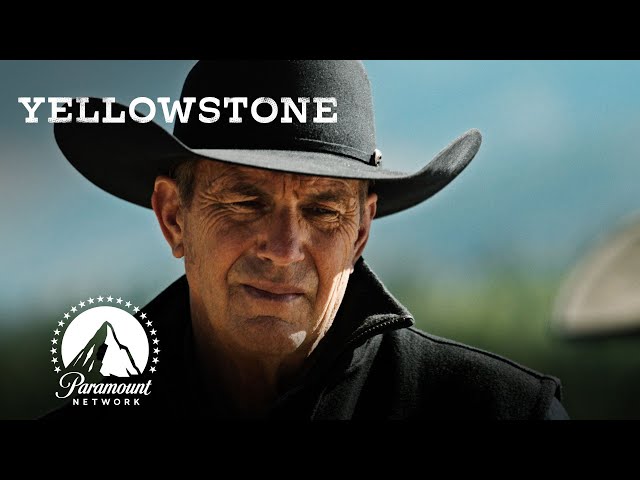
by admin | Nov 18, 2021 | Behind the Bucking Chutes
By Scott Hilgendorff / Cowboys of the Cross
“They’re just words.”
There’s recently been a lot of discussion and debate about the tv series Yellowstone, started by an article from RFD TV, about the language in the show.
People seemed evenly split on whether they watch the show or not based on the language and content of the show. But observations were made that when someone complained about the language in online discussions, it led to attacks against them by the people defending the language.
Reading through some of it, the most common comment I kept hearing about the language was that they were just words.
Thing is, many of the people on either side identify themselves as Christians and we do in fact need to be really careful that we understand the significance of words.
Why? Because of numerous verses across the Old and New Testaments of the Bible that tell us how important words are.
One verse to start with is this:
Ephesians 4:29 Do not let any unwholesome talk come out of your mouths, but only what is helpful for building others up according to their needs, that it may benefit those who listen.
It makes it clear that language that isn’t wholesome shouldn’t be spoken. Instead, it directs us to speak words that would work toward making life better for another person. The words we speak should only do good.
Look at just a few ways Proverbs shows us the importance of good words.
Proverbs 16:24 “Kind words are like honey–sweet to the soul and healthy for the body.”
Proverbs 15:4 “Gentle words bring life and health; a deceitful tongue crushes the spirit.”
Proverbs 18:4 “A person’s words can be life-giving water; words of true wisdom are as refreshing as a bubbling brook.”
Proverbs 20:15 “Wise speech is rarer and more valuable than gold and rubies.”
But it gets even more serious in the Book of James which has much to say about words and the importance of controlling our speech because of what it is capable.
James 3:6 The tongue also is a fire, a world of evil among the parts of the body. It corrupts the whole body, sets the whole course of one’s life on fire, and is itself set on fire by hell.
In this verse specifically, James warns us that we can be completely corrupted by our tongue, the words we speak. He describes our tongue as a fire and that we can basically release hell on earth through what we say to people.
Throughout the whole chapter, James warns us that we can speak terrible things and do great harm or we can use words to bring life to others. The most important words we can speak are the words that describe the gospel and how to find a saving faith in Jesus Christ.
This is why it’s important not to downplay the words we speak and the words we listen to. They can influence for good, the gospel and Jesus, or they can influence for evil.
The words we speak aren’t, ‘just words.’
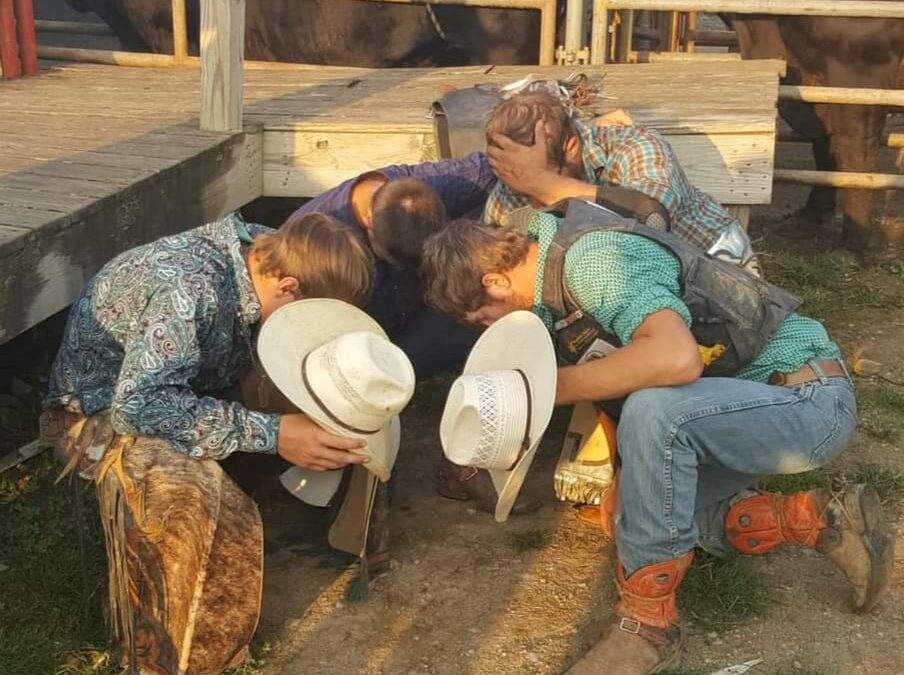
by admin | Nov 4, 2021 | Behind the Bucking Chutes
By Scott Hilgendorff / Cowboys of the Cross
I choose love.
Not words you look to hear from a cowboy with a reputation of toughness to uphold. But that’s not the love I’m talking about. I choose this love.
John 13:34 A new command I give you: Love one another. As I have loved you, so you must love one another.
Jesus loved me enough to die for me and take the punishment meant for my sins. All I have to do is believe, repent and ask to be forgiven and thanks to his love, I can have an eternal and perfect life in Heaven. His love was an action, not a feeling.
I choose love.
It’s a command from Jesus but in a world where we’re divided, fighting with and hating on each other, does he really need to command me?
I choose love. I choose to say, “Hey buddy, I know you barely scraped your fees together tonight to get jerked down like that. I’ve got some extra, let me buy your Taco Bell.”
I choose love. I choose to hold my tongue when the waitress just gave me attitude and instead, ask how I can pray for her when the check comes.
I choose love. I choose to spend some time coaching a gunsel instead of giving up on him or just laughing when he walks by with his spurs upside down and his chaps on an hour and a half before showtime.
I choose love. I choose to cheer for my rival who is about to win the team roping championship after my horse walked through barbwire this morning.
I choose love. I choose to stop by the hospital and check on the guy who got stomped even though he sucker-punched my traveling partner last week for talking to his girl a little too much after the rodeo.
I choose love. I choose to pray for you even though you may never know I’m doing it. I choose to tell others what is good about you or keep my mouth shut. I choose to help you without you knowing it isn’t convenient.
Do I blow it sometimes? Absolutely. Do I repent and apologize or make amends? I try to. Can I do better? Yep. Grace lets me mess it up but Jesus’s love motivates me to do better. I choose that love. I don’t have to like you to love you. You don’t have to like me for me to love you. This love is action and it’s a lot harder than hate or anger. It takes sacrifice, it takes time. It takes putting someone else first. I choose to do what’s hard. I choose to walk into the stampede of anger.
I choose love.

by admin | Oct 21, 2021 | Behind the Bucking Chutes
By Scott Hilgendorff / Cowboys of the Cross
Draw a picture of a horse. Mine will look more like a stick horse unless I have something in front of me to draw from, then it will get a little better. The next person will draw a picture with amazing shading and detail. Another will use unrealistic colors to create their own style. The next will ask, “What kind of horse?” And another will draw the horse and include a barn setting for a background.
Romans 12:4-8 For just as each of us has one body with many members, and these members do not all have the same function, 5 so in Christ we, though many, form one body, and each member belongs to all the others. 6 We have different gifts, according to the grace given to each of us. If your gift is prophesying, then prophesy in accordance with your faith; 7 if it is serving, then serve; if it is teaching, then teach; 8 if it is to encourage, then give encouragement; if it is giving, then give generously; if it is to lead, do it diligently; if it is to show mercy, do it cheerfully.
We all have a couple common tasks that Jesus gave us: to love others and to share the gospel and make disciples.
Through looking at scriptures about what Jesus did in his time here, we can get some idea of how he approached and treated others and we can pull from that just how it is that we’re supposed to carry out those tasks. But we also know that each of us has been given different gifts from God.
Just like how our task to draw a horse will be completed differently, how we love others or how we connect with them or even the methods we use to share the gospel will be different. But the result will be the same. A horse will be drawn. The gospel will be shared. In these few verses from Romans, it’s also made clear we’re to use the gifts we have to the best of our ability. My stick horse might be the best I can do but the horse will still get drawn. I can still take care to draw each line as straight and smoothly as I can.
But Jesus isn’t telling us to draw a horse or do something that doesn’t use skills God has given us. He’s telling us we all have different gifts and gives us examples like showing hospitality or mercy. You may not feel like you’re the best communicator, but you can still explain the gospel to a friend in the best way you know how to share it. A person whose gift is teaching may have an easier time of explaining the gospel to someone but it may be the kindness you show through your gift of hospitality that may be what God uses to make it easier for that person to really listen to the gospel message.
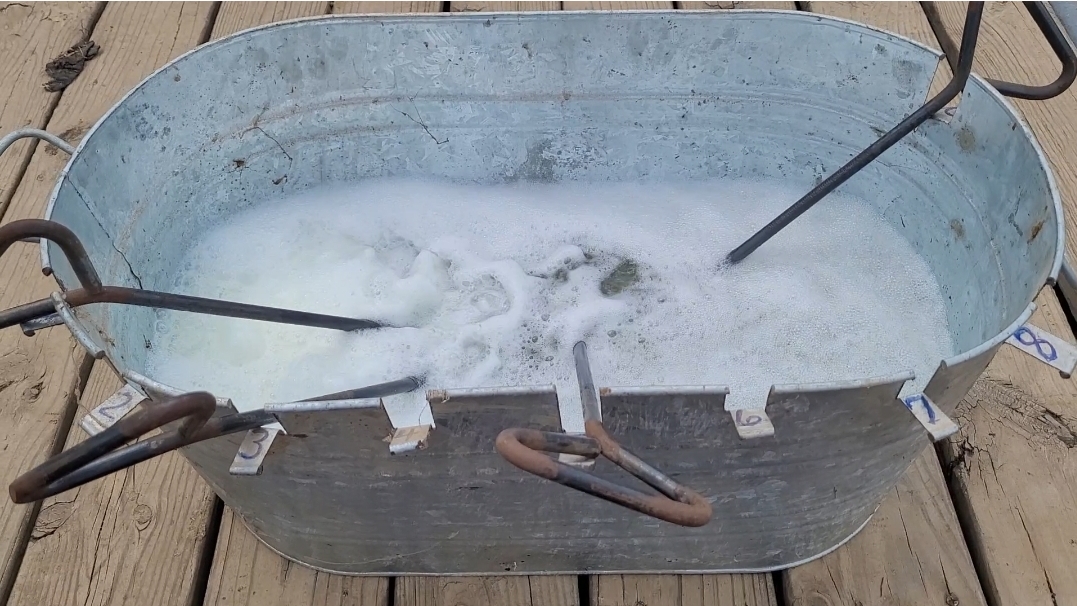
by admin | Sep 23, 2021 | Behind the Bucking Chutes
By Scott Hilgendorff / Cowboys of the Cross
Next to me was a metal tub roiling with a mixture of gasoline and dry ice. Set inside were several numerical brands being super-cooled for the process of cold branding bulls. The process causes their hair to fall out and then grow back with the pigment forever changed to white.
It’s thought to be a less painful form of branding verses hot branding that scars the hide to make the brand.
I was waiting for everyone to gather together for a cowboy church message as the tub was boiling away and it got me thinking about the guys that actually will shape a coat hanger into a brand, heat it in a campfire and brand themselves.
While it’s not an extremely common practice, it’s certainly tied most closely to the cowboy and rodeo communities and it becomes a pretty clear way to show to the world around you that you’re a cowboy.
When we become Christians, followers of Christ whose lives are changed by a saving faith in Jesus, we’re permanently changed by that experience the way the bulls’ hair was going to be permanently changed by that cold branding.
But there’s no outward mark on our bodies that shows we have been changed and while a brand shows what cattleman a herd belongs to, there’s no outward physical change that shows we now belong to Jesus.
John 10:28 I give them eternal life, and they will never perish, and no one will snatch them out of my hand.
In this chapter of John, Jesus is describing us as sheep belonging to him and that no one can take us from him. We belong to him.
There is no need for us to be marked for Jesus to have to prove to anyone that we are his and that no one can take away the eternity Jesus bought for us with his death on the cross.
But, we still can’t help but outwardly show in other ways that we belong to Jesus. The Bible refers to that is fruit—the words and actions we carry out because of how much our salvation means to us and is changing us.
Matthew 7:16-18 By their fruit you will recognize them. Do people pick grapes from thornbushes, or figs from thistles? 17 Likewise, every good tree bears good fruit, but a bad tree bears bad fruit. 18 A good tree cannot bear bad fruit, and a bad tree cannot bear good fruit.
Jesus is warning here against false teachers, letting us know that we can tell who they are but the fruit they produce. Bad will come about from a false teacher but those who belong to Jesus are going to produce good fruit. Sure, Jesus may not have put a brand on our arm to show we belong to him but we won’t be able to hide it either through our words and actions, especially if we carry out his commands to tell others about him and to love others the way he loves us.
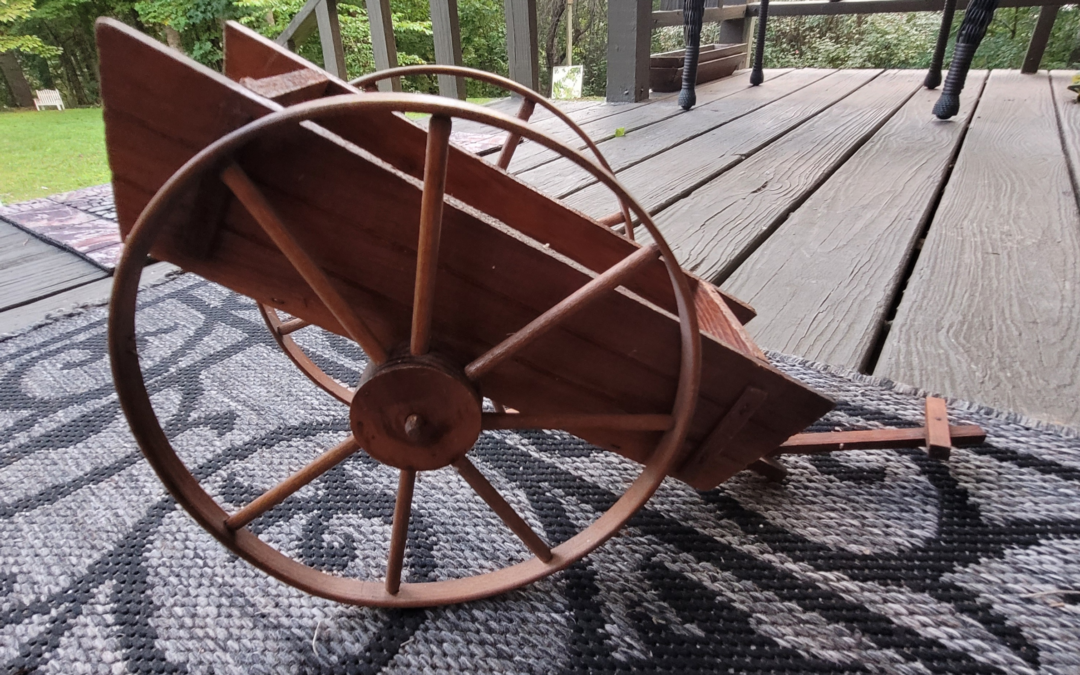
by admin | Sep 9, 2021 | Behind the Bucking Chutes
By Scott Hilgendorff / Cowboys of the Cross
It can become hard to serve others when your services makes them feel like they have to return the favor. The best advice I ever received about being able to serve others in our culture is to actually ask them to serve you first.
It sounds like it goes against what the Bible teaches but here’s what happens: if I’m the new guy in the neighborhood and I try to do something for my neighbors as a way to serve them and get to know them, we unintentionally put them in the position of needing to return the favor; they owe us.
Buuuuut, if you ask THEM to help YOU first, you are now in the position of owing them a favor and unless they are just horribly unfriendly people, most are going to be willing to help you when you ask. You still get to know them, a relationship with the neighbor can start and it will be easier to serve them when opportunities arise.
My friends that explained this to me had this happen with a new family that moved in the neighborhood. I don’t remember the details but they had an opportunity to just jump in and help the family with something fairly significant but after that, found the couple was avoiding them. It wasn’t until my friends tried asking them for help that they all then started talking freely across the street and my friends realized they were being avoided because the couple felt they were in debt for the help and felt awkward.
I’m still the new person on the mountain and have a handful of neighbors where I live near Gatlinburg. One of the couples are descendants of the original family that settled the mountain and eventually sold portions of it that have become a handful of homes and rental cabins that make up our little mountain neighborhood.
When I first got up there, I did a terrible job of meeting more than the closest neighbor who sits a bit behind and above me on the ridge we share.
For awhile, we were mostly just “hey neighbors” or “wave as you go by neighbors” so for the ones I waved “hey” to the most, I decided to bake some cookies as we got close to Christmas two years ago. It’s the only time I do something like that, making shortbread like my mom had made when I was little. I had put plates of them in three neighbor’s mailboxes with Christmas cards and a note with my contact information to sort of introduce myself.
One never said anything, another put a bunch of candy canes back in mine and another didn’t find theirs until a bear had knocked the mail box over that next summer because I put them in a long-since gone relative’s box by mistake. I got a panicked voicemail from the neighbor feeling terrible that they had never acknowledged the gift, not even knowing what it was that the bear had eaten. She apologized repeatedly when I called her back because she felt terrible and I ended up feeling terrible because it had made her feel like she was in an awkward spot.
So I tried the advice I had overlooked the first time around by dropping off cookies. With the neighbor closest to me I had an extended road trip that was taking me away for more than a few weeks and I was able to meet him by actually going over to ask him if I could get him to cut my lawn once while I was away. I offered to pay but he refused.
Perfect. I now owed him.
We have visited multiple times now since then and I’ve been able to help him pile wood with no sense of obligation anymore. We now are both comfortable asking for help if we need it.
But there was still that problem with the original mountain family. That wonderful old-timey culture is deeply rooted. The phone call about the Christmas card found months later at least opened the door for me to drop in the next time I saw them outside. Caught unprepared, the wife excused herself, went inside and came out with a jar of apple butter she had made back in the fall. I had created this need for her to give back. So after a trip home to visit family in Ontario, I came the next time with a box of cookies you can only get in Canada. Because I had expressed interest in it during our conversation, I left with the moon-phase guide to planting a garden they kept on their refrigerator. Next time, having learned she couldn’t eat much sugar, I came with some chips in a style you can only get in Canada and left with a wooden wagon planter from her porch.
Finally, a couple weeks ago, I was getting ready for another trip to Ohio and Ontario when my covid test for the border crossing came back inconclusive and I was going to have to go to town again to take another test. At the same time, my lawn tractor backfired and died on me right as the husband was driving by on his own to cut the lawns on the two rental cabins down from me. I really did need some help and was able to approach him to ask if he had enough gas and time to keep cutting one more while I ran back to town for the second test.
He wouldn’t accept offer of payment and also said he’d help figure out what was wrong with the mower when I get back.
My hope is that by finding myself in real need of help, this has broken the cycle of gift-giving and opened the door to where they won’t mind asking me for help or that I can pitch in when I see a need without having to be given something off their porch.
Philippians 2:3-4 Do nothing out of selfish ambition or vain conceit. Rather, in humility value others above yourselves, 4 not looking to your own interests but each of you to the interests of the others.
The idea of asking for help instead of offering it seems contrary to scripture except it can be an effective way to build a bridge that opens the door to more easily serve those neighbors and develop a closer relationship that allows the gospel to be shared.
Rodeo and bull riding give us all a great opportunity to ask for help and I think in that environment, it’s easier for us to do it either way. If we need help, we’re going to ask for it and if we see someone who needs help, most of us are pretty good at stepping up and helping without being asked. It’s just a natural way of doing things so it doesn’t create that sense of obligation.
But what are some ways we can either serve or ask to be helped in order to build connections with others around us outside the sport? We help others so we can show Jesus to them but however we do it, we need to build connections so we can also tell them who Jesus is and what he did for them.

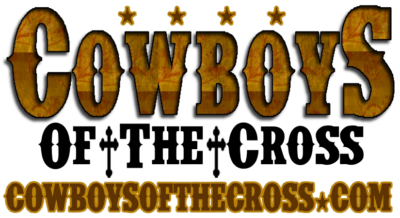





Recent Comments